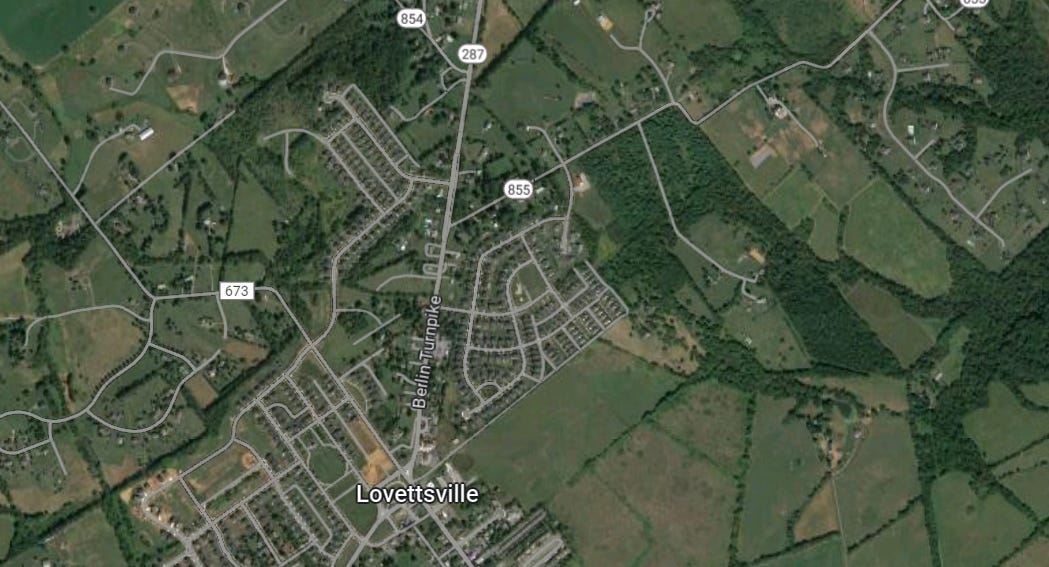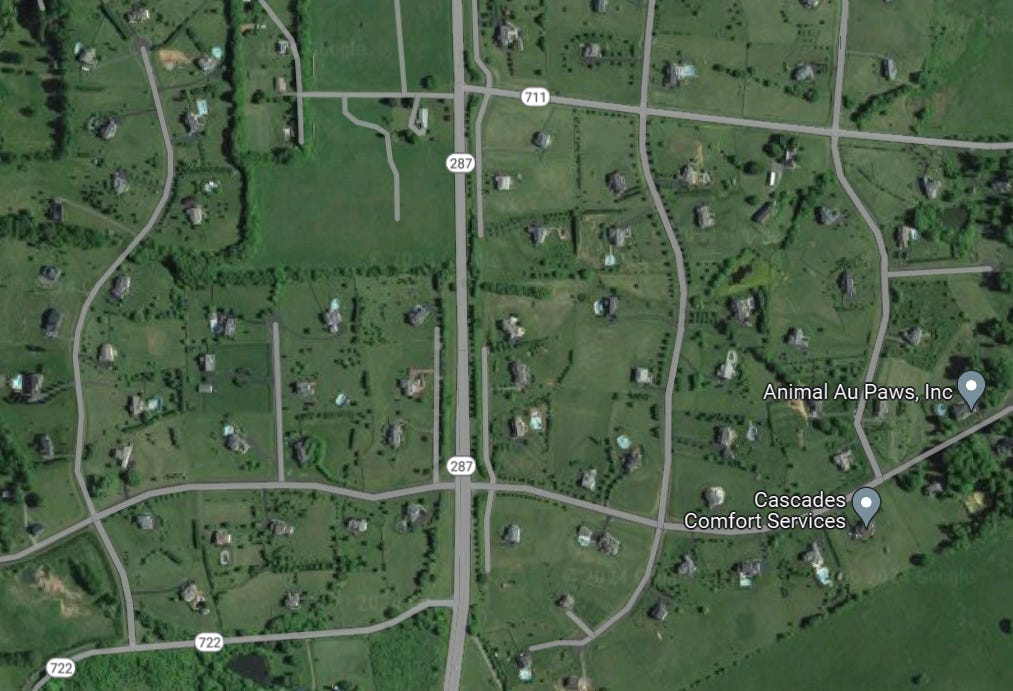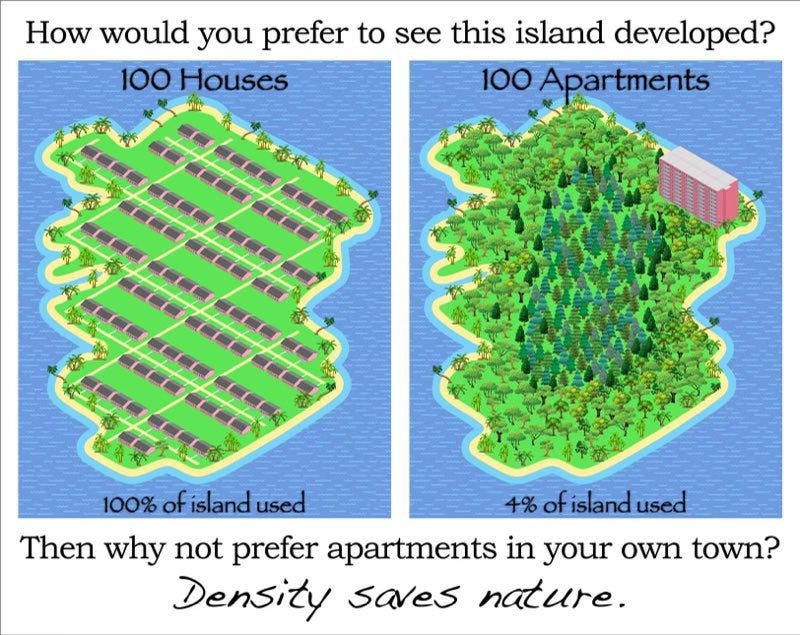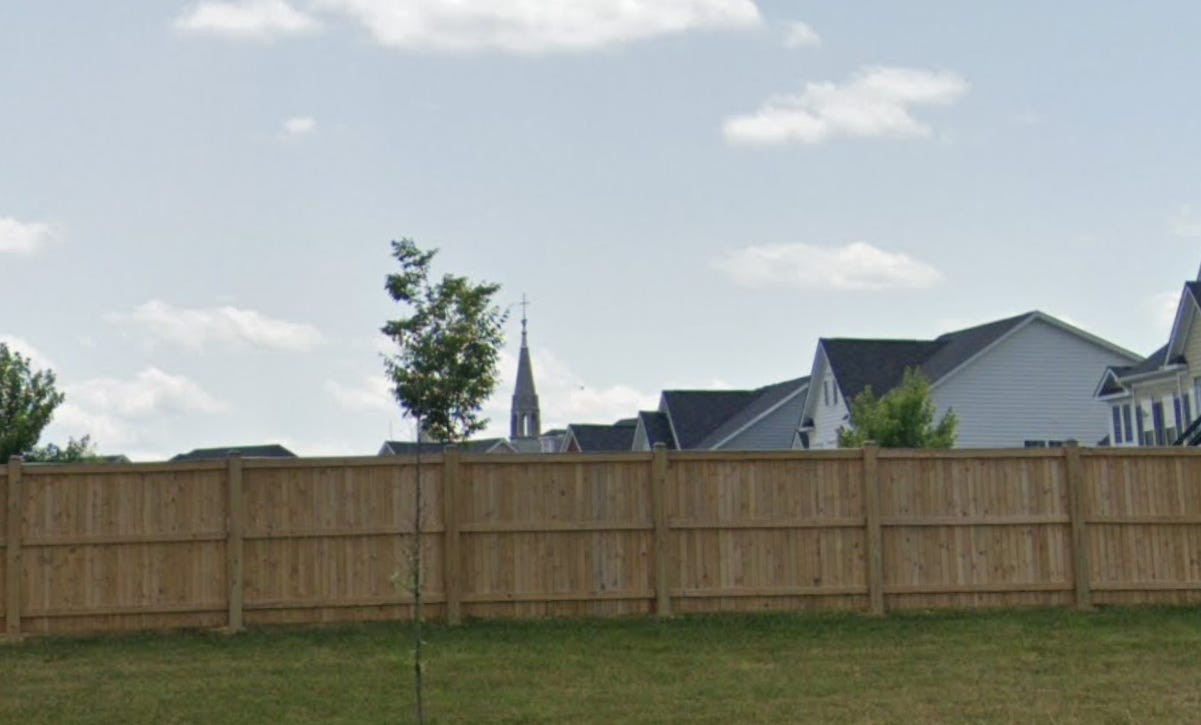The Deleted Scenes - Living On The Edge
My latest piece over at Resident Urbanist is about “cluster zoning”—a land-use strategy to reduce environmental impact by clustering homes close together and leaving more unbuilt green space, either, or both, in the development itself and in the general countryside. Now in an urban context this would be pretty much uncontroversial; it’s just density. But cluster zoning is typically discussed and applied in a semi-rural/exurban context. Whether or not a locality uses that name, it basically looks like this: As opposed to this: Cluster zoning is sort of an environmentalist idea which, I think, predates the mainstreaming of urbanism and housing issues. It makes the legitimate point that seeing green space doesn’t mean a place is environmentally friendly; paving over less overall land and using infrastructure more efficiently is environmentally friendly. There’s a popular image you’ll see on social media making this point (it was actually first made by a member of the YIMBYs of Northern Virginia group!): So all that checks out conceptually for me. But…not quite. A lot of housing and land-use folks instinctively dislike exurban density like this. It feels intuitively like the worst of both worlds: the raw crowdedness of a more urban place, without the street life or commerce or amenities of a city. The distance and compulsory driving of suburbia, without the privacy and quiet and open space. That’s certainly how I’ve always looked at these cluster developments. I always took them to be awful planning and developers being cheap more than an example of an actual planning strategy. I’ve even heard of cluster zoning before, and if you asked me about it, I’d say, yeah, of course, that makes sense. But I never recognized this as that. I have two things to say about it, and I’m curious how other urbanists and housing advocates view this. The first is that exurban or rural density isn’t weird at all—because that’s what a small town is! So why does it feel weird here? My supposition is that while the default American impulse is to complain about the density, the issue isn’t density but the lack of anything except residential development. In other words, low-density residential-only development feels natural to some extent, as does the varied (“mixed-use”) nature of the city. But high densities without any other uses or enterprises in proximity just feels weird.
While it would be difficult, if we could actually make villages instead of tightly packed subdivisions, I bet people would like it! They might tell you they wouldn’t like it. And yet the same people who would tell you they wouldn’t like it lament that they can’t walk to a little bakery or corner store or deli or cafe. We mostly just don’t have a template for what that would look like, other than “the city.” So at best, with some actual creativity and reform, these cluster developments seem like really good opportunities to build genuine new towns or villages. Places that have some “center,” some measure of their own economy. There are little bits and pieces of this here and there. Take a look at this development with a new, old-fashioned-looking church at the center! It’s very recent, and you can imagine maybe in 20 years a place like this maturing into a place. But the other thing I have to say is that I’m not sure we’d even need cluster zoning if we built enough housing in the urban cores and inner suburbs. Whatever the merits of the land-use strategy, a non-zero number of the people living in these houses don’t want to live here. It isn’t a perfectly engineered product that meets people’s desires. It’s a bland, checks-the-boxes-and-constraints thing you settle for. So cluster or not, we could avoid building a lot of this stuff if we just built enough in the places more people want to live. Why are we building out the countryside at all for something a lot of people who end up there don’t affirmatively want? Now, some people affirmatively want it. I got that viewpoint on Twitter where I had a couple of debates over this. Some people said something like, You move here because it’s cheap or because you don’t want urban life, you’re happy to give up a big lawn because your commute is long and you want to maximize family time, you like being closer to the country than to the city. In other words, the idea of good-sized houses on tiny lots far away from most things is actually exactly what some people want. I don’t doubt that, but I’m quite certain a large share of the people who end up in these houses haven’t made that sort of explicit choice and haven’t been waiting for exactly this kind of house. In another piece—scheduled, not published yet!—I write this:
Similarly, somebody choosing an exurban small-lot home because they can afford it and because the long commute makes lawn work less feasible, etc. etc.—for some people, that’s an actual affirmative preference. But for a lot of them, it’s just what they can make work. When you think about it, “People like this housing because it’s cheap” is an argument against it—it’s a way of saying they don’t like it because they like it. And that low price is squeezed from both ends: the lower price is offset in part by the cost of commuting and driving, and the price of more proximate housing is artificially high because we don’t sufficiently build in those places. Okay. So tell me if I’m wrong, and tell me if cluster zoning is good, bad, or complicated. Related Reading: Which Housing Is “Housing Crisis Housing”? Thank you for reading! Please consider upgrading to a paid subscription to help support this newsletter. You’ll get a weekly subscribers-only piece, plus full access to the archive: over 1,000 pieces and growing. And you’ll help ensure more like this! You're currently a free subscriber to The Deleted Scenes. For the full experience, upgrade your subscription. |
Older messages
A Pancake Amid Stacks
Wednesday, June 5, 2024
What Do You Think You're Looking At? #165 ͏ ͏ ͏ ͏ ͏ ͏ ͏ ͏ ͏ ͏ ͏ ͏ ͏ ͏ ͏ ͏ ͏ ͏ ͏ ͏ ͏ ͏ ͏ ͏ ͏ ͏ ͏ ͏ ͏ ͏ ͏ ͏ ͏ ͏ ͏ ͏ ͏ ͏ ͏ ͏ ͏ ͏ ͏ ͏ ͏ ͏ ͏ ͏ ͏ ͏ ͏ ͏ ͏ ͏ ͏ ͏ ͏ ͏ ͏ ͏ ͏ ͏ ͏ ͏ ͏ ͏ ͏ ͏ ͏ ͏ ͏ ͏ ͏ ͏ ͏ ͏ ͏ ͏
Race You To Vine, Winner Gets A Walnut
Tuesday, June 4, 2024
Duplicate streets and thoughts on the nature of towns and cities ͏ ͏ ͏ ͏ ͏ ͏ ͏ ͏ ͏ ͏ ͏ ͏ ͏ ͏ ͏ ͏ ͏ ͏ ͏ ͏ ͏ ͏ ͏ ͏ ͏ ͏ ͏ ͏ ͏ ͏ ͏ ͏ ͏ ͏ ͏ ͏ ͏ ͏ ͏ ͏ ͏ ͏ ͏ ͏ ͏ ͏ ͏ ͏ ͏ ͏ ͏ ͏ ͏ ͏ ͏ ͏ ͏ ͏ ͏ ͏ ͏ ͏ ͏ ͏ ͏ ͏ ͏ ͏
Technology, Delayed Gratification, And Cities
Monday, June 3, 2024
Urbanism is a physical manifestation of human needs ͏ ͏ ͏ ͏ ͏ ͏ ͏ ͏ ͏ ͏ ͏ ͏ ͏ ͏ ͏ ͏ ͏ ͏ ͏ ͏ ͏ ͏ ͏ ͏ ͏ ͏ ͏ ͏ ͏ ͏ ͏ ͏ ͏ ͏ ͏ ͏ ͏ ͏ ͏ ͏ ͏ ͏ ͏ ͏ ͏ ͏ ͏ ͏ ͏ ͏ ͏ ͏ ͏ ͏ ͏ ͏ ͏ ͏ ͏ ͏ ͏ ͏ ͏ ͏ ͏ ͏ ͏ ͏ ͏ ͏ ͏ ͏ ͏ ͏ ͏
New and Old #163
Monday, June 3, 2024
Friday roundup and commentary ͏ ͏ ͏ ͏ ͏ ͏ ͏ ͏ ͏ ͏ ͏ ͏ ͏ ͏ ͏ ͏ ͏ ͏ ͏ ͏ ͏ ͏ ͏ ͏ ͏ ͏ ͏ ͏ ͏ ͏ ͏ ͏ ͏ ͏ ͏ ͏ ͏ ͏ ͏ ͏ ͏ ͏ ͏ ͏ ͏ ͏ ͏ ͏ ͏ ͏ ͏ ͏ ͏ ͏ ͏ ͏ ͏ ͏ ͏ ͏ ͏ ͏ ͏ ͏ ͏ ͏ ͏ ͏ ͏ ͏ ͏ ͏ ͏ ͏ ͏ ͏ ͏ ͏ ͏ ͏ ͏ ͏ ͏ ͏ ͏ ͏
Saturation
Monday, June 3, 2024
Why does it feel harder to *do* anything these days? Or does it? ͏ ͏ ͏ ͏ ͏ ͏ ͏ ͏ ͏ ͏ ͏ ͏ ͏ ͏ ͏ ͏ ͏ ͏ ͏ ͏ ͏ ͏ ͏ ͏ ͏ ͏ ͏ ͏ ͏ ͏ ͏ ͏ ͏ ͏ ͏ ͏ ͏ ͏ ͏ ͏ ͏ ͏ ͏ ͏ ͏ ͏ ͏ ͏ ͏ ͏ ͏ ͏ ͏ ͏ ͏ ͏ ͏ ͏ ͏ ͏ ͏ ͏ ͏ ͏ ͏ ͏ ͏ ͏
You Might Also Like
This Dreamy Dress Trend Will Be Everywhere In 3 Months
Friday, February 28, 2025
Fairytale moments from London Fashion Week. The Zoe Report Daily The Zoe Report 2.27.2025 This Dreamy Dress Trend Will Be Everywhere In 3 Months (Runway) This Dreamy Dress Trend Will Be Everywhere In 3
3x3: February 27, 2025
Friday, February 28, 2025
February is the worst month ͏ ͏ ͏ ͏ ͏ ͏ ͏ ͏ ͏ ͏ ͏ ͏ ͏ ͏ ͏ ͏ ͏ ͏ ͏ ͏ ͏ ͏ ͏ ͏ ͏ ͏ ͏ ͏ ͏ ͏ ͏ ͏ ͏ ͏ ͏ ͏ ͏ ͏ ͏ ͏ ͏ ͏ ͏ ͏ ͏ ͏ ͏ ͏ ͏ ͏ ͏ ͏ ͏ ͏ ͏ ͏ ͏ ͏ ͏ ͏ ͏ ͏ ͏ ͏ ͏ ͏ ͏ ͏ ͏ ͏ ͏ ͏ ͏ ͏ ͏ ͏ ͏ ͏ ͏ ͏ ͏ ͏ ͏ ͏ ͏ ͏ ͏
Should You Do Cardio Before or After You Lift Weights?
Thursday, February 27, 2025
View in Browser Men's Health SHOP MVP EXCLUSIVES SUBSCRIBE Should You Do Cardio Before or After You Lift Weights? Should You Do Cardio Before or After You Lift Weights? If you're combining two
This Google Tool Can Hide Your Personal Info From Search
Thursday, February 27, 2025
Alexa Is Getting an AI Upgrade. Take your privacy back from Google Search. Not displaying correctly? View this newsletter online. TODAY'S FEATURED STORY This Google Tool Can Help Hide Your Personal
“Shakespearean Red,” Dirty Blonde, & More Of Spring’s Biggest Hair Color Trends
Thursday, February 27, 2025
Plus, the spiritual meaning of the new moon, your daily horoscope, and more. Feb. 27, 2025 Bustle Daily LIFE Did Smart Phones Make Us All Stream-Of-Consciousness Texters? Sajina Shrestha self-
Her Student Loans Were Forgiven. Then They Came Back.
Thursday, February 27, 2025
Today in style, self, culture, and power. The Cut February 27, 2025 PERSONAL FINANCE She Thought Her Student Loans Were Gone. Then They Came Back to Haunt Her. Student borrowers are seeing ghost loans
How fast-food apps took over the drive-thru
Thursday, February 27, 2025
Around the world, King Cake inspires community
"Love remains a jewel in the hand, guarded"
Thursday, February 27, 2025
͏ ͏ ͏ ͏ ͏ ͏ ͏ ͏ ͏ ͏ ͏ ͏ ͏ ͏ ͏ ͏ ͏ ͏ ͏ ͏ ͏ ͏ ͏ ͏ ͏ ͏ ͏ ͏ ͏ ͏ ͏ ͏ ͏ ͏ ͏ ͏ ͏ ͏ ͏ ͏ ͏ ͏ ͏ ͏ ͏ ͏ ͏ ͏ ͏ ͏ ͏
Win Two Tickets To A Major Music Festival & A Shopping Spree!
Thursday, February 27, 2025
Thanks To Marshalls. Feb. 27, 2025 Bustle Daily Enter To Win Tickets To A Major Music Festival, Thanks To Marshalls Presented by Marshalls Enter To Win Tickets To A Major Music Festival, Thanks To
Cat Story
Thursday, February 27, 2025
How we got that cat ͏ ͏ ͏ ͏ ͏ ͏ ͏ ͏ ͏ ͏ ͏ ͏ ͏ ͏ ͏ ͏ ͏ ͏ ͏ ͏ ͏ ͏ ͏ ͏ ͏ ͏ ͏ ͏ ͏ ͏ ͏ ͏ ͏ ͏ ͏ ͏ ͏ ͏ ͏ ͏ ͏ ͏ ͏ ͏ ͏ ͏ ͏ ͏ ͏ ͏ ͏ ͏ ͏ ͏ ͏ ͏ ͏ ͏ ͏ ͏ ͏ ͏ ͏ ͏ ͏ ͏ ͏ ͏ ͏ ͏ ͏ ͏ ͏ ͏ ͏ ͏ ͏ ͏ ͏ ͏ ͏ ͏ ͏ ͏ ͏ ͏ ͏ ͏ ͏ ͏ ͏



